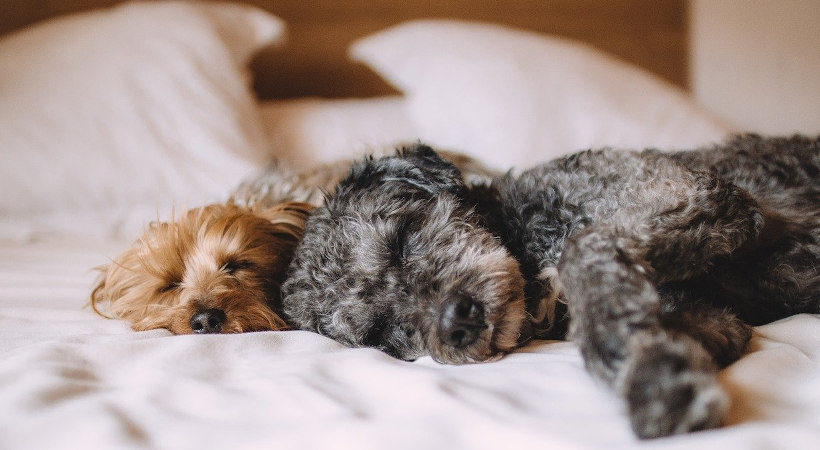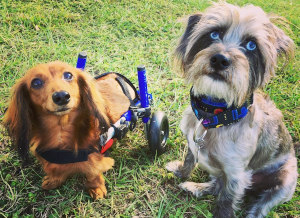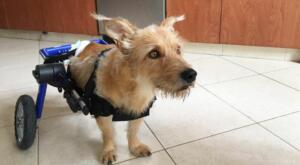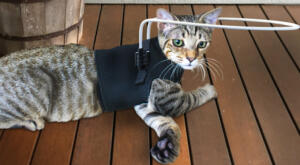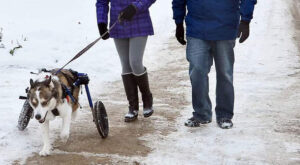When you live with a disabled pet, you might notice that they have trouble sleeping. A disability can cause your beloved best friend to sleep more than usual, or sleep less due to discomfort or pain. Although animals have more flexibility with their sleep schedules than humans, they also require more sleep. Doing everything you can to help your pet get adequate rest can help them stay comfortable and healthy and reduce any discomforts they may be experiencing. This could mean making some changes to your home and routine, but the payoff is knowing you are doing everything you can for your furry friend.
How to Help Your Pet Get Plenty of Sleep
Helping your special needs pet get enough sleep is remarkably similar to helping a human get better sleep: Getting plenty of exercise and mental stimulation and maintaining good sleep habits and a healthy environment go a long way to a great night of sleep.
Talk to Your Vet
If you see your pet having sleep challenges, talk with your veterinarian. Sometimes, changes to medication or other treatments can make a big difference in your pet’s ability to sleep. Your vet may also be able to pinpoint any specific issues or provide recommendations to help you make your pet more comfortable.
Create a Comfortable Sleeping Area
Every pet deserves a clean, comfortable place to sleep, but disabled pets may have special needs that require some adjustments. Consider investing in a warming bed to help ease your pets aches and pains, or a bed with bolsters to provide extra feelings of security. For a pet with incontinence or mobility issues that prevent them from getting up in time to urinate, invest in a specially designed dog bed that redirects moisture away from their body and helps them stay more comfortable and prevent skin irritation if you can’t get to them right away.
If your pet typically sleeps with you, you may need to make some changes to your own sleeping arrangements as well. Sleeping with pets who are disabled might mean installing a ramp to make getting in and out of bed easier, or a safety rail to prevent them from rolling out of bed.
Pay Close Attention to Temperature
Many pets with paralysis have difficulty regulating their own body temperature. If they are too hot or cold, it can disrupt their sleep, so watch for signs that they are too hot or cold, and make adjustments as needed. Again, a heated bed may be helpful to keep your pet from getting too cold, or some extra water or fan can cool them down if they show signs of being too warm. Remember to change their position every few hours to help support circulation and regulate temperature.
Keep Them Engaged
Every pet needs to remain engaged. Mental stimulation is as important to supporting healthy sleep as physical activity. As much as possible, encourage physical activity; blind or deaf dogs, for instance, can (and should) still go for walks; as long as they are leashed and supervised, it’s perfectly safe. If your pet has mobility issues, even short wheelchair walks to sniff the neighborhood can help them stay engaged with the world. Providing toys and just spending time together can keep them engaged and provide enough stimulation to support sleep.
When it’s time for bed, you can help your pet calm down with a gentle massage. Slow, gentle strokes can relax a stressed or anxious animal, and help them get more rest
Create a Healthy Sleeping Environment
Any pet, regardless of disability, needs a healthy environment to support their sleep. Do your best to maintain a consistent routine, feeding and walking your pet at the same times every day. In fact, feeding your pet a few hours before bed so they have time to digest the food, and then taking a walk right before bed so they can go to the bathroom supports a good night’s sleep.
Much like humans, pets like having a quiet, comfortable place to sleep. Placing their sleeping area away from loud noises and bright light helps them sleep better. Some pets may also get better rest if they have white noise, which can help them remain calm and drown out any other sounds.
Some dogs also experience anxiety when it’s time to sleep. Letting your dog sleep near you can help them feel more secure, and sleep more soundly. Sleeping near your pet also ensures that you can hear them if they have trouble during the night and respond more quickly.
If your pet continues to have trouble sleeping despite your best effort, talk with your veterinarian. They may have more ideas, or recommend some medication or supplements to support better sleep. Keep your vet informed about any changes, and work together to give your pet a healthy and comfortable life.


Related Articles:
Did we answer all your questions on "sleeping"?

